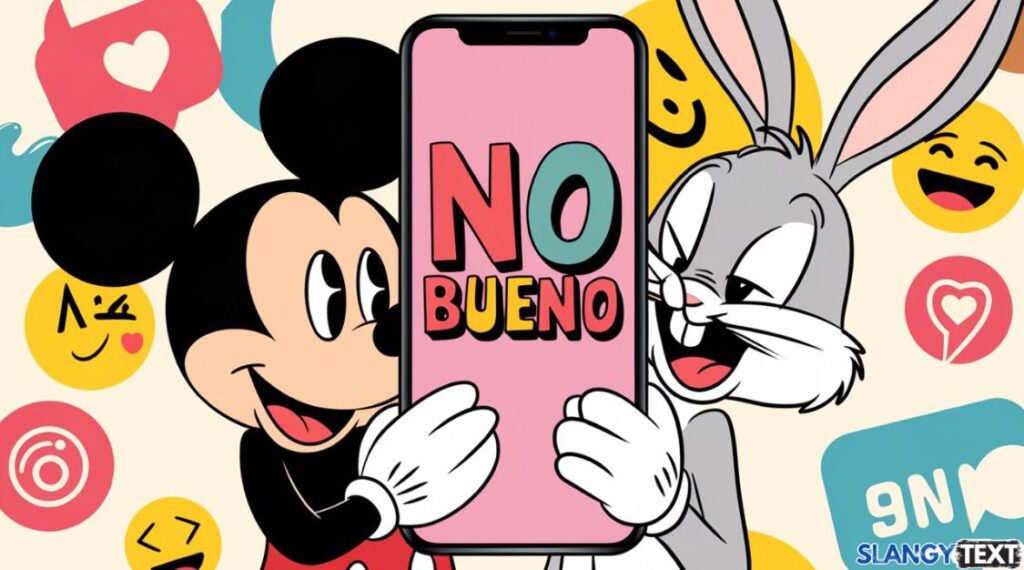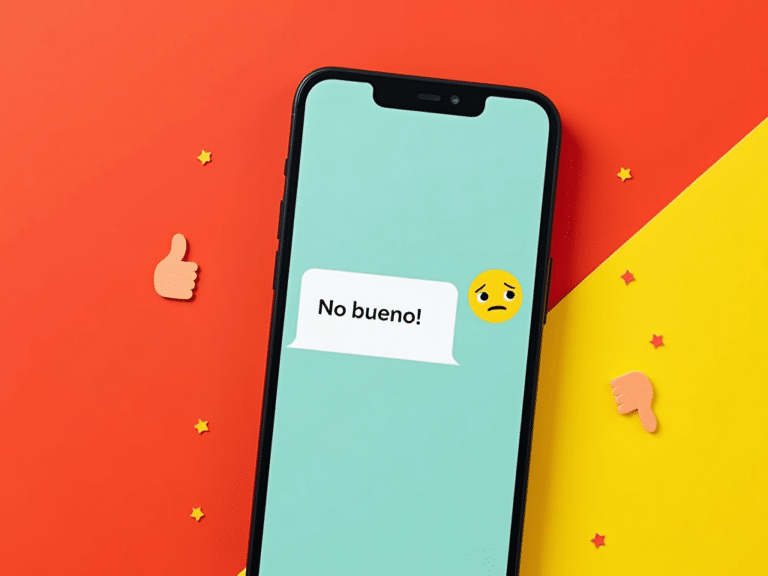Ever find yourself at a loss for words when something just isn't up to par? "No bueno" might just be the phrase you're looking for, even if it bends the rules of proper Spanish.
In the vast landscape of language, certain phrases emerge from cultural exchange, evolving and adapting as they cross borders. "No bueno" is a prime example. It's a colloquialism, a linguistic hybrid that's found a comfortable niche in the English vernacular. But what exactly does it mean, and where did it come from? While its roots are firmly planted in Spanish, its current usage carries a unique flavor, sometimes diverging from its original context.
| Category | Information |
|---|---|
| Phrase | No bueno |
| Origin | Spanish |
| Literal Translation | No good; Not good |
| Usage | Colloquial expression in English to indicate something is bad, unfavorable, or undesirable. |
| Grammatical Correctness (Spanish) | Considered grammatically incorrect by native Spanish speakers. Proper phrasing would be "No est bueno" or "No es bueno." |
| Grammatical Correctness (English) | Accepted as slang or informal expression. |
| Popularity | Gained traction among English speakers in the late 2000s and has become a staple in contemporary slang. |
| Examples |
|
| Cultural Significance | Demonstrates the influence of Spanish language and culture on American English. Represents the evolution of language through slang and cultural exchange. |
| Reference | Urban Dictionary |
At its heart, "no bueno" is a relatively casual expression, perfectly acceptable in conversations with friends or acquaintances. Imagine someone inviting you to a show you'd rather skip; a simple "no bueno!" conveys your lack of enthusiasm. Its a more colorful way of saying "That's never going to happen" or simply "no." The phrase itself has journeyed from Spanish into English, becoming a handy way to express that something is "not good" or unfavorable.
- Neil Darishs Alaskan Dream Inside Edge Of Alaskas Story
- Indian Movies Online Streaming Guide Where To Watch Free
In a direct Spanish-language context, "no bueno" translates literally to "not good" or "no good." The phrase experienced a surge in popularity among English speakers in the late 2000s, steadily solidifying its place as a recognizable piece of contemporary slang. Its a linguistic import that has found a welcoming home in the ever-evolving landscape of informal English.
So, what exactly is the definition of no bueno? Well, it's a Spanish phrase that means "no good" or "not good." Intriguingly, while the words themselves are Spanish, the expression as it's used is arguably more American than anything else. As Urban Dictionary points out, while "no bueno" can be technically translated to "no good," many native Spanish speakers wouldn't naturally use the term in the same way. It's a subtle difference that highlights the nuances of language and cultural context.
The phrase "no bueno" has been adopted into English from Spanish as a colloquial expression, meaning "not good" or "bad." Its popularity stems from increased exposure to the Spanish language, travel experiences, and the ever-present force of cultural exchange. Its a testament to the way languages borrow and adapt from one another.
- Bolly4u More Watch Bollywood Hollywood Movies Online Guide
- Explore Dame Emma Thompson Awards Roles Biography Now
If someone is telling you "no bueno," it's their way of expressing disapproval or disagreement. To put it in Spanish, "Me dices a m: no bueno." But remember to check your spelling and grammar in more formal settings, like homework or emails, where slang might not be appropriate. It's a matter of choosing the right tool for the job.
There are plenty of examples of "no bueno" in English, real sentences that show how to use it correctly. Its common usage makes it a versatile expression, applicable in a wide array of situations. Here are just a few common ways the phrase finds its use:
However, it's worth noting that there are ways people may say "no bueno" incorrectly. Some might assume it's grammatically correct Spanish, but its not. Using it when addressing native Spanish speakers might lead them to believe you have a less-than-perfect grasp of the language. The proper Spanish phrases for "not good" are "no est bueno" or "no es bueno." So, the use of "no bueno" is often considered improper Spanish by native speakers. Its a case of incorrect Spanish grammar evolving into accepted regional slang and dialect.
So, where exactly did the phrase "no bueno" originate? As mentioned earlier, "bueno" is the translation for "good." Unlike "bien," "bueno" is an adjective, which means it has plural and feminine forms. Furthermore, "bueno" is a word that we use to describe a noun, and typically, this word is placed after the noun.
To truly understand the phrase, it helps to translate what "bueno" means in various contexts. When it comes to expressing a similar sentiment to "pues," many Spanish speakers often use the word "bueno." While "pues" is more commonly used to indicate hesitation or uncertainty, "bueno" is often used to express agreement or acceptance. The nuances are subtle, but they contribute to the richness of the language.
Here are some additional examples of how "no bueno" can be used: "That movie was no bueno. I didn't like it at all." Or, "I'm not feeling well today. I'm no bueno." And even, "This food is no bueno. It's too spicy for me." It truly is a versatile phrase that can be used in a variety of situations, a useful way to express your disapproval or dislike.
The words "bien," "bueno," and "buen" are some of the most regularly used Spanish words, and they often cause confusion for new learners of the language. Using "estoy bueno/a" instead of "estoy bien" can mean the difference between saying "I am hot" (as in good looking) or "I am well." A simple guide can help you cut through the confusion and use them correctly.
"No bueno" is a mix of English and Spanish, which makes it a prime example of Spanglisha linguistic blend that's become super popular in bilingual communities. The phrase itself translates to "not good" in English, but its origins run deeper than that. Its an expression of a shared cultural experience.
Ultimately, the definition of "no bueno" is simple: it's Spanish, actually, meaning 'no good.' Other examples of Spanglish include counting in Spanish (uno, dos, tres) while speaking English. These linguistic quirks add color and vibrancy to our everyday conversations.
Here are some automatically generated practical examples in English: "Things are no bueno between Kathy Hilton and Kyle Richards." As Real Housewives of Beverly Hills fans know all too well, the two siblings had a major meltdown during a season 12 cast trip to Aspen that was shown on Bravo last year. Perez Hilton, on March 16, 2023, declared "This no bueno."
Understanding when to use bueno, buenos, buena and buenas is crucial. As mentioned before, bueno is the translation for good. Unlike bien, bueno is an adjective which means it has plural and feminine forms. Furthermore, bueno is a word that we use to describe a noun. This word is placed after the noun.
You probably know when to use one or the other because of the translation, but then you might find out you failed to choose correctly. After reading a short but clear explanation, youll get it right. The meaning of bueno and malo are straightforward: bueno and malo are adjectives. In general, bueno means good and malo means bad. For example, you can say "este helado est muy bueno" (this ice cream is very good) or "fumar no es bueno para la salud" (smoking is not good for your health). When referring to feminine nouns, you would use the feminine form, "buena."
In conclusion, "no bueno" isn't just a casual phrase; it's a cultural artifact. It reflects the diverse influences that shape our language and the power of slang to unite and define communities. Its a reminder that language is a living, breathing entity, constantly evolving and adapting to the world around us. So, the next time you find yourself reaching for a way to express your displeasure, remember the humble, yet versatile, "no bueno." Just remember to tread carefully and consider your audience.



Detail Author:
- Name : Ms. Laney Rosenbaum III
- Username : hirthe.elfrieda
- Email : aurelio95@mclaughlin.biz
- Birthdate : 1986-08-04
- Address : 30259 Amari Path Paucekmouth, SC 09372-2812
- Phone : +1-251-408-7470
- Company : Watsica Inc
- Job : Elementary and Secondary School Administrators
- Bio : Consectetur eos veniam consequatur. Et quo tempore aliquid. Voluptatum consectetur laboriosam eaque earum qui.
Socials
instagram:
- url : https://instagram.com/sunny.stark
- username : sunny.stark
- bio : Dolores deleniti corrupti ipsam omnis. Tempore aliquam ipsum ratione minima nihil dolores.
- followers : 1553
- following : 1468
twitter:
- url : https://twitter.com/sunny90
- username : sunny90
- bio : Consequatur ad nihil debitis non vero. Dolore accusamus explicabo ipsum adipisci rerum. Provident vitae nulla iusto sunt.
- followers : 1134
- following : 1101
linkedin:
- url : https://linkedin.com/in/starks
- username : starks
- bio : Soluta saepe sint modi.
- followers : 6314
- following : 2207